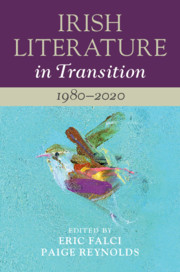Book contents
- Irish Literature in Transition, 1980–2020
- Irish Literature in Transition
- Irish Literature in Transition, 1980–2020
- Copyright page
- Contents
- Contributors
- Series Preface
- General Acknowledgements
- Acknowledgements
- Introduction
- Part I Times
- Chapter 1 The Contemporary Conditions of Irish Language Literature
- Chapter 2 The Cultures of Poetry in Contemporary Ireland
- Chapter 3 Troubles Literature and the End of the Troubles
- Chapter 4 Contemporary Irish Theatre and Media
- Chapter 5 Writing Childhood: Young Adult and Children’s Literature
- Coda: Eavan Boland and Seamus Heaney
- Part II Spaces
- Part III Forms of Experience
- Part IV Practices, Institutions, and Audiences
- Index
Chapter 3 - Troubles Literature and the End of the Troubles
from Part I - Times
Published online by Cambridge University Press: 28 February 2020
- Irish Literature in Transition, 1980–2020
- Irish Literature in Transition
- Irish Literature in Transition, 1980–2020
- Copyright page
- Contents
- Contributors
- Series Preface
- General Acknowledgements
- Acknowledgements
- Introduction
- Part I Times
- Chapter 1 The Contemporary Conditions of Irish Language Literature
- Chapter 2 The Cultures of Poetry in Contemporary Ireland
- Chapter 3 Troubles Literature and the End of the Troubles
- Chapter 4 Contemporary Irish Theatre and Media
- Chapter 5 Writing Childhood: Young Adult and Children’s Literature
- Coda: Eavan Boland and Seamus Heaney
- Part II Spaces
- Part III Forms of Experience
- Part IV Practices, Institutions, and Audiences
- Index
Summary
Considering novels, poetry, drama, and non-fictional prose, this chapter examines how writers represented the Troubles and the gradual gains of the peace process between 1980 and 1998. It considers the historical displacements of Brian Friel’s Translations and Seamus Deane’s Reading in the Dark (1996), the realism of Ciaran Carson’s The Irish For No (1987) and Belfast Confetti (1989), the staging of women’s lives during the Troubles in Anne Devlin’s Ourselves Alone (1985), the phantasmagorias of Paul Muldoon’s poetry and the metaphorisations of war and violence in Medbh McGuckian’s verse, and the Belfast panoramas of Glenn Patterson’s Fat Lad (1992) and Robert McLiam Wilson’s Eureka Street (1996). Contemporary Northern writers contextualise the conflict by illuminating the country’s colonial past; they narrate structures of trauma by examining how history invades the present; they present palliative correctives to the vicious linearity of the conflict; and they project possible resolutions to the exhausted (il)logic of sectarian strife.
Keywords
- Type
- Chapter
- Information
- Irish Literature in Transition: 1980–2020 , pp. 65 - 80Publisher: Cambridge University PressPrint publication year: 2020
- 1
- Cited by

